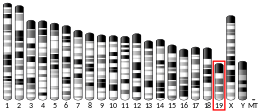KCNK18
KCNK18
Protein-coding gene in the species Homo sapiens
Potassium channel subfamily K member 18 (KCNK18), also known as TWIK-related spinal cord potassium channel (TRESK) or K2P18.1 is a protein that in humans is encoded by the KCNK18 gene. K2P18.1 is a potassium channel containing two pore-forming P domains.[5]
Quick Facts Identifiers, Aliases ...
| KCNK18 | |||||||||||||||||||||||||||||||||||||||||||||||||||
|---|---|---|---|---|---|---|---|---|---|---|---|---|---|---|---|---|---|---|---|---|---|---|---|---|---|---|---|---|---|---|---|---|---|---|---|---|---|---|---|---|---|---|---|---|---|---|---|---|---|---|---|
| Identifiers | |||||||||||||||||||||||||||||||||||||||||||||||||||
| Aliases | KCNK18, K2p18.1, MGR13, TRESK, TRESK-2, TRESK2, TRIK, potassium two pore domain channel subfamily K member 18 | ||||||||||||||||||||||||||||||||||||||||||||||||||
| External IDs | OMIM: 613655 MGI: 2685627 HomoloGene: 133808 GeneCards: KCNK18 | ||||||||||||||||||||||||||||||||||||||||||||||||||
| |||||||||||||||||||||||||||||||||||||||||||||||||||
| |||||||||||||||||||||||||||||||||||||||||||||||||||
| |||||||||||||||||||||||||||||||||||||||||||||||||||
| |||||||||||||||||||||||||||||||||||||||||||||||||||
| |||||||||||||||||||||||||||||||||||||||||||||||||||
| Wikidata | |||||||||||||||||||||||||||||||||||||||||||||||||||
| |||||||||||||||||||||||||||||||||||||||||||||||||||
Close
A flaw in this gene could help trigger migraine headaches. If the gene does not work properly, environmental factors can more easily trigger pain centres in the brain and cause a severe headache.[6]
- "Human PubMed Reference:". National Center for Biotechnology Information, U.S. National Library of Medicine.
- "Mouse PubMed Reference:". National Center for Biotechnology Information, U.S. National Library of Medicine.
- Goldstein SA, Bayliss DA, Kim D, Lesage F, Plant LD, Rajan S (December 2005). "International Union of Pharmacology. LV. Nomenclature and molecular relationships of two-P potassium channels". Pharmacol. Rev. 57 (4): 527–40. doi:10.1124/pr.57.4.12. PMID 16382106. S2CID 7356601.
- Lafrenière RG, Cader MZ, Poulin JF, Andres-Enguix I, Simoneau M, Gupta N, Boisvert K, Lafrenière F, McLaughlan S, Dubé MP, Marcinkiewicz MM, Ramagopalan S, Ansorge O, Brais B, Sequeiros J, Pereira-Monteiro JM, Griffiths LR, Tucker SJ, Ebers G, Rouleau GA (September 2010). "A dominant-negative mutation in the TRESK potassium channel is linked to familial migraine with aura". Nature Medicine. 16 (10): 1157–1160. doi:10.1038/nm.2216. PMID 20871611. S2CID 205387180.
- "Migraine cause 'identified' as genetic defect". BBC News. 2010-09-27.
- Andres-Enguix I, Shang L, Stansfeld PJ, Morahan JM, Sansom MS, Lafrenière RG, Roy B, Griffiths LR, Rouleau GA, Ebers GC, Cader MZ, Tucker SJ (2012). "Functional analysis of missense variants in the TRESK (KCNK18) K+ channel". Scientific Reports. 2. article number 237. doi:10.1038/srep00237. PMC 3266952. PMID 22355750.
- Czirják G, Tóth ZE, Enyedi P (2004). "The two-pore domain K+ channel, TRESK, is activated by the cytoplasmic calcium signal through calcineurin". J. Biol. Chem. 279 (18): 18550–8. doi:10.1074/jbc.M312229200. PMID 14981085.
- Kang D, Mariash E, Kim D (2004). "Functional expression of TRESK-2, a new member of the tandem-pore K+ channel family". J. Biol. Chem. 279 (27): 28063–70. doi:10.1074/jbc.M402940200. PMID 15123670.
- Barrios-Rodiles M, Brown KR, Ozdamar B, et al. (2005). "High-throughput mapping of a dynamic signaling network in mammalian cells". Science. 307 (5715): 1621–5. Bibcode:2005Sci...307.1621B. doi:10.1126/science.1105776. PMID 15761153. S2CID 39457788.
- Czirják G, Vuity D, Enyedi P (2008). "Phosphorylation-dependent binding of 14-3-3 proteins controls TRESK regulation". J. Biol. Chem. 283 (23): 15672–80. doi:10.1074/jbc.M800712200. PMC 3259650. PMID 18397886.
- Pottosin II, Bonales-Alatorre E, Valencia-Cruz G, et al. (2008). "TRESK-like potassium channels in leukemic T cells". Pflügers Arch. 456 (6): 1037–48. doi:10.1007/s00424-008-0481-x. PMID 18506476. S2CID 3245155.
- Sano Y, Inamura K, Miyake A, et al. (2003). "A novel two-pore domain K+ channel, TRESK, is localized in the spinal cord". J. Biol. Chem. 278 (30): 27406–12. doi:10.1074/jbc.M206810200. PMID 12754259.
- KCNK18+protein,+human at the U.S. National Library of Medicine Medical Subject Headings (MeSH)
This membrane protein–related article is a stub. You can help Wikipedia by expanding it. |



